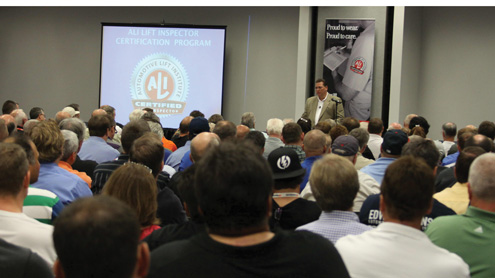
A new certification program is standardizing vehicle lift inspections
The Automotive Lift Institute (ALI), Cortland, NY, the trade association of North American vehicle lift manufacturers, kicked off the world’s first third-party certification program for vehicle lift inspectors last year. The program is in response to growing demand from businesses that use vehicle lifts as well as the governmental health and safety organizations that monitor them. The new program provides third-party assurance an ALI-certified lift inspector has tested competent to inspect any vehicle lift. ALI says anyone with a minimum 12 months experience as a vehicle lift inspector may apply to participate in the certification program.

“As OSHA and other health and safety officers have stepped up enforcement of lift safety and inspection standards in recent years, the demand for qualified lift inspectors has grown,” says ALI President R.W. “Bob” O’Gorman. “This has resulted in an increase in shops looking for qualified automotive lift inspectors. Before this, without a national certification program in place, vehicle lift inspection companies haven’t been able to offer independent validation that their inspectors are qualified.”
Inspectors enforce the ANSI National Standard on vehicle lift operation, inspection and maintenance (ANSI/ALI ALOIM: 2008), which requires an inspection by qualified automotive lift inspectors on all vehicle lifts at least once a year.
ALI has invested more than $700,000 to develop the program, which includes extensive reference and testing materials. Outgoing ALI Chairman Douglas Grunnet says a select pilot group of approximately 50 lift safety experts helped to refine the program over the last two years.
Keith Bunn, one of the pilot program’s factory-designated trainers, stresses that this program will not educate candidates on the structural and mechanical principles in automotive lift equipment design. Rather, it will determine who is educated enough to evaluate whether the condition of that equipment maintains its safe and reliable use within those principles.
ALI Senior Project Engineer Dale Soos reviewed the certification process and the materials provided to candidates in the program. The program includes extensive printed training materials, a six-hour Participants Orientation workshop, a written pre-course exam, a final course exam, and documented practical experience.
An online directory that launches in May will list all lift inspection companies with ALI Certified Lift Inspectors on staff.
“This is a really easy way for someone to take the final steps on the path to becoming an ALI Certified Lift Inspector,” says O’Gorman. “The ALI Lift Inspector Certification Program is brand new and we want to make things as convenient as possible to encourage people to participate.”
While testing sites are located in most major U.S. cities, O’Gorman notes that Canadian-based candidates can contact ALI directly for options available to them. BR
